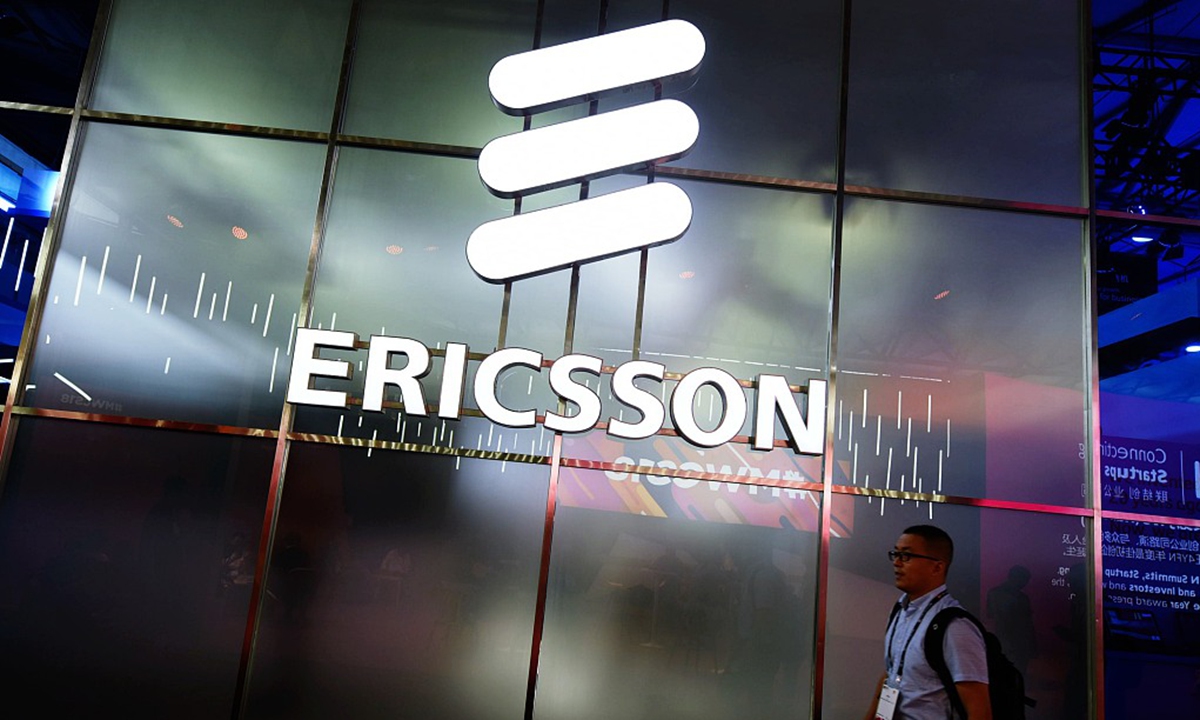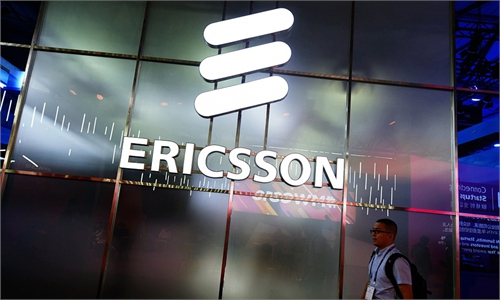
Ericsson. Photo: VCG
Commenting on Huawei's exclusion from Sweden's 5G rollout and the fate of Ericsson in China, Chinese Ambassador to Sweden Gui Congyou urged Sweden to stop politicizing Huawei's 5G equipment and said that Ericsson's situation in China will be decided by the Chinese market and consumers.
The comments raised a question whether Ericsson can compete with Huawei in both the Chinese and the Swedish markets, if there were no political factors involved. Analysts say the Swedish firm "has little significant edge" over its Chinese competitor.
In an interview, Gui told local newspaper Expressen that China resolutely objects the ban on Huawei equipment in Sweden, which was not based on facts and had no legal support, according to a transcript on the website of the Chinese Embassy in Sweden.
The Swedish government was also urged to uphold openness, fairness and transparency as market principles and correct its mistakes soon, providing a normal and lawful environment for Chinese companies in Sweden, the ambassador said, noting that Ericsson's situation in China will be decided by the Chinese market and consumers.
Chinese telecom equipment providers Huawei and ZTE have dominant positions in China's 5G market with shares of about 60 percent and 30 percent, respectively, according to some industry insiders, while all other companies - including Ericsson and Nokia - take up the remaining 10 percent, which is in line with previous bidding results of the nation's major telecom carriers.
Ericsson recorded surging profits in the Chinese market last year, given its aggressive strategy to compete for 5G contracts. For example, major telecom carriers such as China Telecom and China Unicom selected the firm as a 5G radio access network (RAN) vendor.
Though it secured some contracts with Chinese carriers last year, which also boosted its confidence in the Chinese market, this round of 5G tests could be critical to Ericsson's business in China, since the 5G bidding, which aims to build RAN equipment, accounts for a large proportion of 5G spending, up to 75 percent.
However, Ericsson still lags behind Huawei in some major technologies. For example, the Chinese firm has been leading in energy conservation, microwave technology, and wired and wireless convergence, as well as in the number of patents, Ma Jihua, a veteran industry analyst, told the Global Times on Wednesday.
Huawei has the most declared 5G patents with 3,007 patent families followed by Samsung and LG with 2,317 and 2,147 patent families, respectively. Nokia follows LG, having secured fourth position with 2,047 patent families, while Ericsson and Qualcomm are in fifth and sixth places, according to industry analysis firm Amplified and GreyB.
Despite the US-led worldwide crackdown on Huawei for geopolitical reasons, the Chinese company is still leading worldwide in terms of revenue. It ranked No.1 with about 31 percent of total revenue among major suppliers, some industry analysis has shown.
In Sweden, after telecom regulator The Swedish Post and Telecom Authority (PTS) banned the use of equipment from Huawei last year, telecom operator Tre - which has signed contracts with Huawei for building its network in Sweden - filed a suit against the ban, according to media reports.
"Huawei has its own research center in Sweden, where it maintains long-term friendly cooperation with some local departments," Ma said, explaining the competitive edges of Huawei in Sweden.
While the Chinese Ambassador said that the fate of Ericsson will be decided by the Chinese market and consumers, some industry experts said that Huawei has an edge in fast responses and quality services.
Several equipment makers probably took part in this year's third-phase pre-bidding communication, and soon, a crucial procurement process for RAN will kick off, with carriers hoping to diversify their choices, Cui Kai, senior research manager of the telecommunications and IoT Research Department of IDC, told the Global Times on Wednesday.
"When Ericsson was catching up to leading companies like Huawei, especially in terms of pricing and technology, it might have gained more chances to be selected by major carriers. But given the current circumstances, including the political factors, that chance has declined," Cui said.
Chinese mobile operators have invited Ericsson to participate in their 5G equipment tests and these invitations, which offer the Swedish firm an opportunity to "interview" for access to China's 5G market, could be the last chance for Sweden to pull back from its wrong decision to exclude Chinese firms such as Huawei from participating in its 5G construction, a source close to the matter told the Global Times on Monday.
The source also stressed that participating in the 5G test in China does not mean Ericsson will be chosen, and Sweden has to carefully reconsider its China policy in this regard.
Some Chinese experts also warned that Ericsson has little significant technological edge to influence the decisions made by China's major carriers' on 5G contracts. The source previously warned that the invitation to Ericsson was just an "interview opportunity", not a job offer, since the Chinese people won't tolerate any vicious deed against them and Sweden's ban is seen as bad in nature and has to be corrected.




